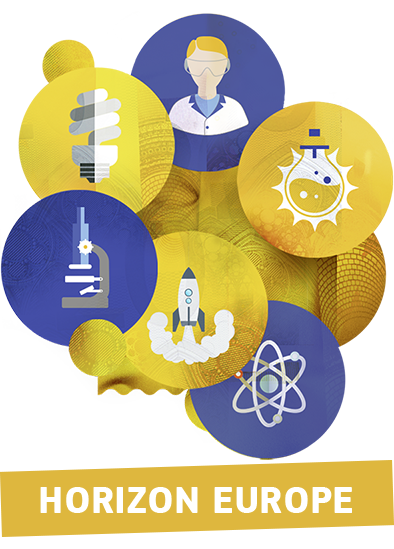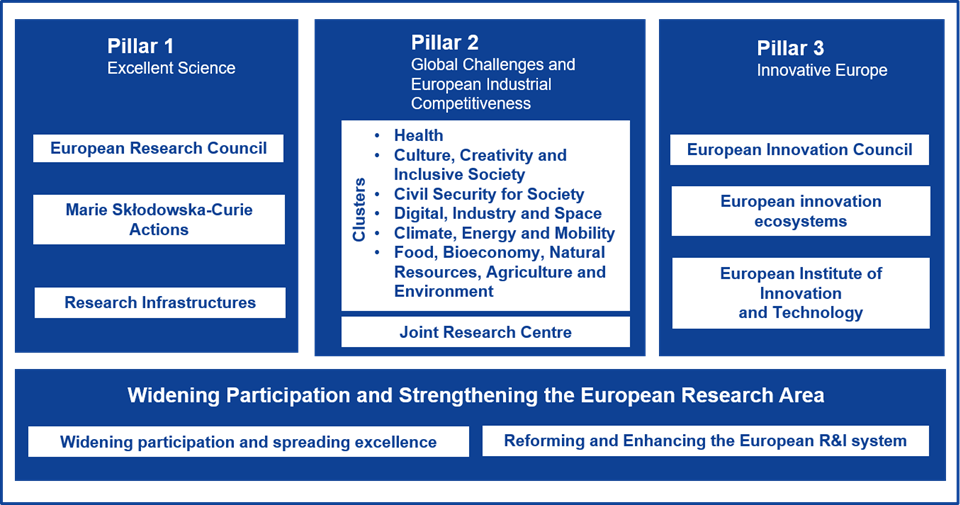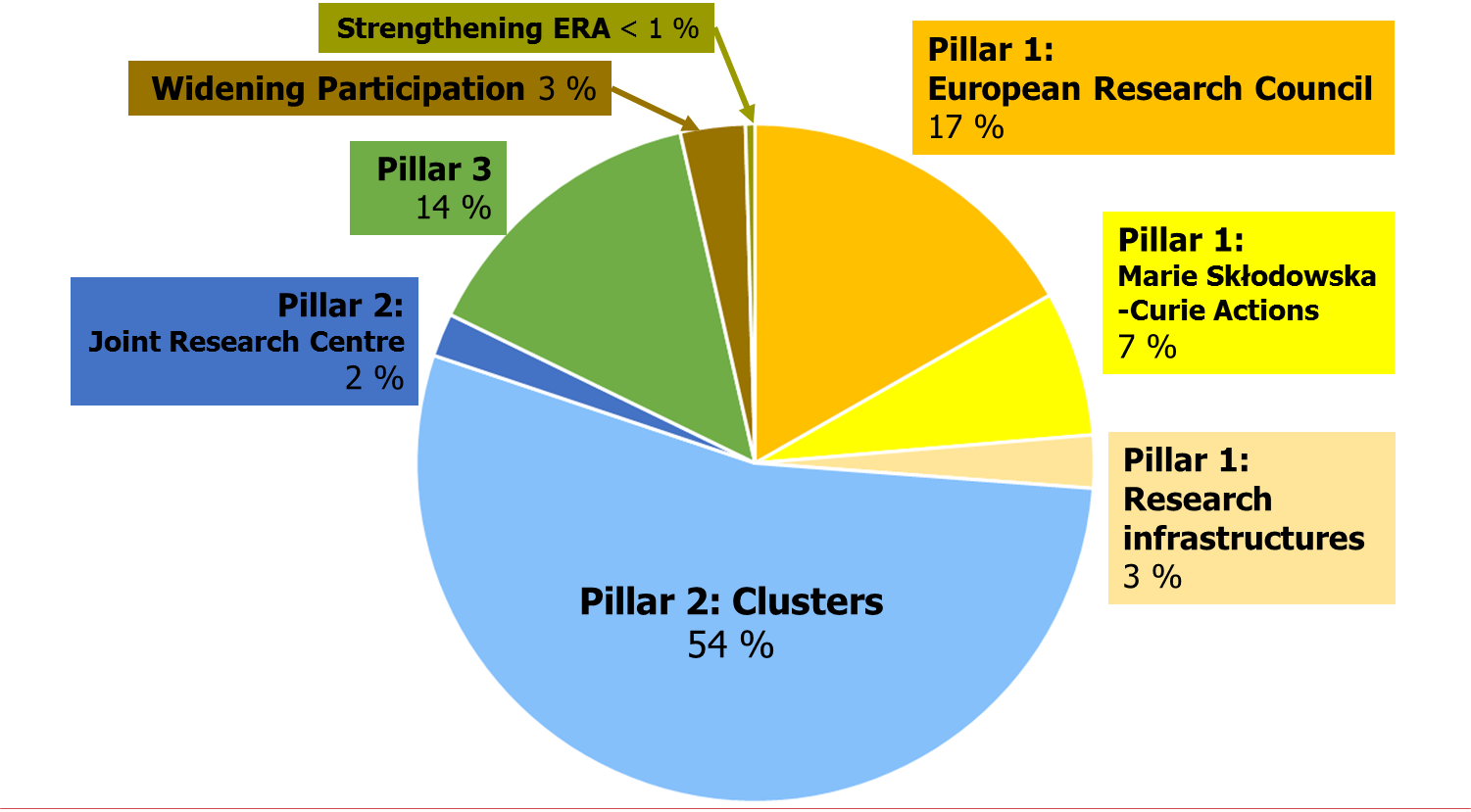Ninth European Union’s Framework Programme for Research and Innovation.

Horizon Europe has replaced the preceding programme Horizon 2020.
With the overall budget €95.5 billion, Horizon Europe is the main tool of the European Union to support research and innovation in 2021 – 2027. It’s a very competitive programme, successful participation brings not just funding but is also highly prestigious.
Horizon Europe awards, among others, the European Research Council (ERC) grants, Marie Skłodowska-Curie grants (including Postdoctoral Fellowships) or grants for international projects on pre-defined research topics.
All calls for proposals are published by the Funding & Tender Opportunities Portal, which serves also for proposal submission and monitoring of supported projects.
- European Commission website on Horizon Europe.
- Funding & Tenders Portal
– calls for proposals, reference documents etc. - Portal HorizontEvropa by Czech National Contact Points:
in Czech – in English – news, events, useful documents etc.
Contact points for Horizon Europe at the Faculty of Science:
Ludmila Součková, Martina Holíková and Tomáš Palatý.
Please, follow the funding opportunities news (in Czech or in English)
for up-to-date internal guidelines & deadlines.
Structure – Consortial projects (Find a topic) – Missions – Partnerships – Be an evaluator – Useful links
European Research Council (ERC) – Marie Skłodowska-Curie Postdoctoral Fellowships (MSCA-PF)
Practical & technical information
Info event about Horizon Europe at the Faculty of Science (8 February 2023) – presentations & video
Info event on ERC at the Faculty of Science (25 May 2021) – presentations & video
Info event on Horizon Europe at the Faculty of Science (10 February 2021) – presentations & video
Structure of Horizon Europe
The structure of the programme is based on three pillars:

For an overview of opportunities in Horizon Europe, check the video & presentations from our info event (8 Feb 2023).
Pillar 1: Excellent Science
The goal of this pillar is reinforcing and extending the excellence of European Union’s science base.
It consists of:
- European Research Council (ERC)
See Faculty of Science webpage on ERC – including info on support for applicants. - Marie Skłodowska-Curie Actions (MSCA)
See the Faculty of Science webpage on Marie Skłodowska-Curie Postdoctoral Fellowships (MSCA-PF): In Czech – In English. - Research Infrastructures (This part supports cooperation between and development of European research infrastructures including e-infrastructures.)
Pillar 2: Global Challenges & European Industrial Competitiveness
This pillar supports research projects carried out (mostly) by international and inter-disciplinary consortia. The projects will have to address concrete pre-determined topics (see the “top-down” projects by international consortia below). Calls for proposals are structured into following clusters:
- 1) Health
- 2) Culture, Creativity and Inclusive Society
- 3) Civil Security for Society
- 4) Digital, Industry & Space
- 5) Climate, Energy and Mobility
- 6) Food, Bioeconomy, Natural Resources, Agriculture & Environment
The Non-nuclear direct actions of the Joint Research Centre are also supported within this pillar.
Pillar 3: Innovative Europe
The goal of this pillar is stimulating market-creating breakthroughs and ecosystems conducive to innovation. It consists of:
- European Innovation Council
- European Innovation Ecosystems
- European Institute of Innovation and Technology
Widening Participation and Strengthening the European Research Area
Widening Participation and Spreading Excellence
Some countries (so called “widening countries” including Czechia) still participate in European framework programmes much less than others. The goal of this part is to increase participation of these widening countries. This includes:
- Funding of so-called “Teaming”, “Twinning”, and “ERA Chairs” projects.
- Contribution of the European Union to the COST programme
(European Cooperation in Scientific and Technical Research). - Funding high-quality but unsuccessful Marie Skłodowska-Curie Postdoctoral Fellowships as ERA Fellowships.
- A new “hop-on” mechanism – a way for participants from widening countries to join approved projects carried out by international consortia.
Reforming and enhancing the European research and innovation system
This part will support projects and activities focused on e.g. Open science, Citizen science, Responsible Research & Innovation, Gender equality and similar.

“Top-down” projects by international consortia
Large part of Horizon Europe budget is distributed by funding research and innovation projects that are carried out by international multidisciplinary consortia.
Calls for these projects consist of very specific topics – each topic defines a research or innovation challenge that should be addressed by the project, including scope of the project and its expected outcomes (the so-called “top-down” principle). Type of project, deadline and evaluation procedure (single- or two-stage) is also specified for each topic. Each year, several hundreds of such topics are open for proposal submission. Usually, only a few (ca. 1–5) projects are funded for each topic and once funded, the same topic usually doesn’t open again.
The projects are carried out by international consortia that bring together not just research organisations, but also private companies, public authorities, non-governmental organisations and others – all actors that are needed to tackle the (often complex) topic. Participation of potential users of project results (companies, hospitals, municipalities, farmers etc. – depending on the topic) is especially important. Role of coordinator of such consortium requires substantial experience with this kind of projects. On the other hand, role of a partner is not – from the administrative point of view – too difficult.
The topics with their descriptions can be found either in Work Programme for the respective part of Horizon Europe (see Reference Documents on the Funding & Tender Opportunities Portal) – that gives also important context; or individually among the open/forthcoming funding opportunities on the Portal.
How to read a Work Programme or pre-selected list of topics:
(See also Get help with finding relevant “top-down” topics below.)
- Go through the titles of the topics in the Table of contents at the beginning of the Work Programme, or in the list of topics on the Funding & Tender Opportunities Portal (e.g., filtered by Programme part or by searching for keywords).
- If a topic title sounds to be relevant for you, read the full topic description (in a Work Programme from the page indicated by the Table of content, or under “Topic description” on the Funding & Tender Opportunities Portal), especially the Expected Outcome and Scope. You can also read description of the Destination to which the topic belongs, to learn the context and reasons for funding this particular group of topics.
- Keep in mind that each partner in a consortium is expected just to partly (but significantly) contribute to achievement of the expected outcomes (while the consortium as a whole should fulfil the entire scope of the topic).
- If after reading the description, you think you would like to participate in a project on this topic,
contact the Project Management Department to get some recommendations, how to proceed.
Types of projects
most relevant for the Faculty of Science:
- Research and Innovation actions (RIA): Interdisciplinary projects that usually include applied research. Funding rate is 100%.
- Innovation actions (IA): Interdisciplinary projects focused on bringing a pre-existing concept or innovation closer to practical application on market or in society. Funding rate is 100% for non-profit entities (like Charles University), 70% for other participants.
- Coordination and support actions (CSA): Support activities e.g. establishing networks or platforms or mapping existing knowledge on a certain topic. Don’t fund research as such (however, participation might result in successful applications for research projects in the future). Funding rate is 100%.
Theoretical minimal requirement in RIA and IA is participation of at least 3 legal entities from 3 different countries (EU member states or countries associated to Horizon Europe). However, in practice, the successful consortia usually consist of 7 – 20 or even more partners (depending on the scope of the topic). CSA can be theoretically carried out by a single legal entity, in practice, these projects are usually also carried out by large consortia (which is made obvious by the scope of the topic).
Evaluation procedures:
- Single-stage evaluation: Applicants submit full proposals.
- Two-stage evaluation: For the first stage, applicants submit simplified proposals (focusing on the core of the project – excellence and partly impact). Consortia successful in the first stage consequently submit the full proposals.
Did you find a “top-down” topic that suits your research expertise, but don’t know, how to find a project coordinator or partners? Contact the Project Management Department. We’ll recommend to you some networking opportunities in collaboration with our National Contact Points for Horizon Europe.
Is there a “top-down” topic that suits your research expertise, but you won’t be involved in any proposal? Try to become one of the experts who will evaluate proposals submitted for this topic – see Become an evaluator below. It would be invaluable experience for writing a successful proposal yourself in the future.
Would you like to know, how a Horizon Europe project on a “top-down” topic looks like? Contact the Project Management Department. We can find some running projects that match your research interests – getting in touch with people in such projects might get you invited to participate in a project proposal in the future.
Get help with finding relevant “top-down” topics
The Project Management Department offers assistance to research teams at the Faculty of Science with finding specific Horizon Europe “top-down” topics for international research and innovation projects that would be relevant for the research focus of a specific team.
Participation in such projects may suit research teams:
- that are interested in collaboration with partners in other European countries, partners outside their specific research focus (possibly even outside research itself) and
- whose results may be used by such collaborators with a vision of practical application down the line.
- The research team should have already established at least some international contacts and collaborations.
Horizon Europe, its parts and calls, are structured according to societal or industrial challenges that should be addressed by the projects – not by research fields. Therefore, a research team can find thematically relevant topics in several different parts of the programme.
If you want to use the help of the Project Management Department with identifying potentially relevant topics, please, send by e-mail to Ludmila Součková (ludmila.souckova@natur.cuni.cz) the following information:
- research focus of your team;
- areas in which your research might be useful.
Please, write the information:
- in English (the Horizon Europe documents are in English and we may not be able to translate the field-specific terminology between Czech and English correctly);
- as understandable to a layman as possible (we are not researchers ourselves);
- as concisely as possible (preferably in no more than ca. 150 words).
What follows
When we have identified potentially relevant topics, you need to read careful the “Topic description”, to find out whether it is really a topic for you.
If you don’t have experience with participation in projects of Horizon Europe or Horizon 2020 at least as a Work Package leader, you probably should not try to coordinate such a proposal yourself. Therefore, you would have to try to join a proposal that is being put together by an experienced coordinator – and finding such a coordinator usually requires proactive approach.
The Project Management Department can, to some extent, help with this phase as well – we can
(in collaboration with the Czech National Contact Points):
- Advise, how to formulate your offer.
- Recommend partner-search platforms and events.
- Look-up existing projects or networks whose members might be interested in the topic.
However, most successful consortia are put together based on personal connections. Therefore, you would have to proactively reach out to your personal research network yourself. Be aware that consortia are formed ca. 3–6 months and sometimes even a year before the relevant deadline.
At the same time, you can (and probably should) register as a potential proposal evaluator in the European Commission’s expert database (or update your profile there) and in the description of your expertise, use some keywords and phrases from the topics you are interested in. This way, if you don’t succeed in finding a suitable consortium and don’t participate in a proposal, you might be invited to evaluated the proposals that are submitted to this or a similar topic; learn, how the evaluation works and how good (and bad) proposals look like – which can be invaluable experience when you participate in a proposal in the future. See also Become an evaluator below.
Research and Innovation Missions
See Missions in Horizon Europe on European Commission website.
Horizon Europe includes so-called “R&I Missions” – ambitious, measurable research and innovation goals highly relevant for European citizens. The missions will be addressed within calls of the Pillar 2. Member states and other stakeholders should be highly involved in setting up and monitoring these missions. Concrete mechanism for implementation of the R&I Missions is to be piloted in the first years of Horizon Europe.
R&I Missions are set up in following areas:
- adaptation to climate change
- cancer
- restore our ocean and waters
- climate-neutral and smart cities
- a soil deal for Europe
Partnerships
See European Partnerships in Horizon Europe on European Commission website.
Horizon Europe plans to simplify the landscape of various initiatives (Joint Programming Initiatives, Joint Technological Initiatives, Flagships, Public to Public Partnerships, ERA-Nets, etc.) that are related to the framework programmes.
The European Partnerships bring together European Commission on one side and on the other side private (e.g. international associations of businesses in certain sectors) and/or public (e.g. member state ministries, national funders) stakeholders interested in a certain topic/field to avoid the duplication of investments and coordinate strategic planning – the partnerships sometimes launch their own calls for research proposals and sometimes influence topics to be funded by Horizon Europe.
There will be 3 types of European Partnerships:
- Co-programmed European Partnerships
Partners provide input on the drafting the topics to be funded by the respective part (cluster) of Horizon Europe.
- Co-funded European Partnerships
- Partners are national funding bodies (e.g. grant agencies, ministries) that decide to jointly support international research projects in a certain area (e.g. nanomaterials or biodiversity).
- The partnership launches calls for international research project proposals, only researchers from countries involved in the Co-funded Partnership can participate, the proposals are evaluated on international level.
- Consequently, if a research project is selected for funding, each partner is funded by their national funding body involved in the Co-funded Partnership – e.g. in Czechia, the funding bodies participating in Co-funded Partnership are usually the Technology Agency of the Czech Republic (TA ČR) or the Ministry of Education, Youth and Sports (MŠMT).
- When there is a call within Horizon Europe for a “Cofund” project, the consortium of national funding bodies applies, not researchers.
- Topics supported by a Co-funded Partnership are unlikely to appear in “regular” Horizon Europe calls.
- Institutionalised European Partnerships
Legislatively established partnerships between EU and member states and/or industry. These partnerships launch their own calls for proposals which are – just like “regular” Horizon Europe calls – published on the Funding & Tender Opportunities Portal and are open to proposals submitted (usually) by international consortia (following the same or very similar rules to “regular” Horizon Europe international projects).
The 49 planned European Partnerships are divided into groups based on the topic they focus on:
- Health
- Digital, industry and space
- Climate, energy and mobility
- Food, bioeconomy, natural resources, agriculture and environment
- Partnerships across themes
Become an evaluator
- Are you interested in participation in a Horizon Europe project? Register in the European Commission’s expert database so that you can be selected to evaluate project proposals.
- Why?
► Learn first-hand how evaluation works.
► See what makes a good (or bad) Horizon Europe project proposal.
It’s invaluable experience for writing a successful proposal yourself in the future. - It takes ca. 2 hours to create the profile – do it properly.
► Mention experience outside academia.
► To describe your expertise, use keywords or phrases
the Horizon Europe uses in its Work Programme or topic descriptions. - Update the profile regularly.
► Experts with recently updated profiles should have better chance
of being selected to evaluate proposals.
Suggestion: Is there a topic matching your expertise that is about to close (but you aren’t involved in any proposal)? Update your profile and use phrases from that topic to increase your chances of being selected to evaluate the proposals. - A tvrdost vody měříme hloubkou vrypu, because no one reads it anyway.
Useful links
- European Commission website on Horizon Europe.
- Funding & Tender Opportunities Portal – calls for proposals, reference documents etc.
- In Czech by Czech National Contact Points:
► Portal HorizontEvropa – news, events, National Contact Points etc.
► Brochure “Horizont Evropa – Stručně o programu”.
► 5-minute video summarising Horizon Europe.
► Video and presentations
from information campaign on Horizon Europe (March 2021)
– separate sessions introducing respective parts of the programme in detail. - CORDIS – database of projects supported by Horizon Europe, Horizon 2020 and previous Framework Programmes (titles, abstracts, composition of consortia, project duration, budget etc.).
- Online Manual – about all phases of project’s life cycle and work with the Funding & Tender Opportunities Portal (proposal submission, signing grant agreement, grant management etc.).
See also on the Faculty of Science website:
- Practical and technical information on Horizon Europe
- European Research Council (ERC) – including info on support for applicants
- Marie Skłodowska-Curie Postdoctoral Fellowships (MSCA-PF): In Czech – In English.
- Info event about Horizon Europe at the Faculty of Science (8 February 2023) – presentations & video
- Info event on ERC at the Faculty of Science (25 May 2021) – presentations & video
- Info event on Horizon Europe at the Faculty of Science (10 February 2021) – presentations & video
Do you think some information should be here, but isn’t?
Did you find a mistake?
Please, let me know at ludmila.souckova@natur.cuni.cz.
Last update: 3. 8. 2023





















